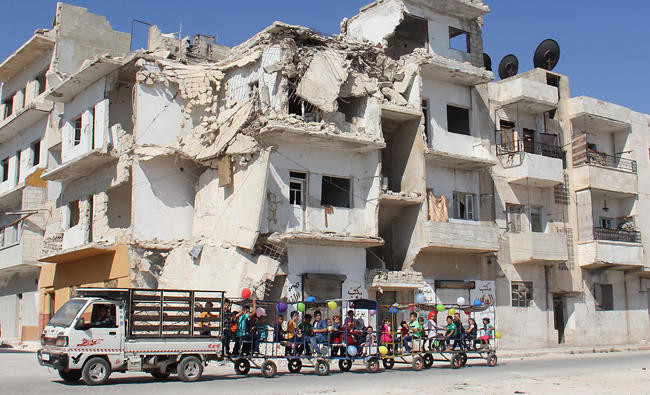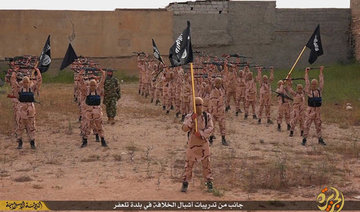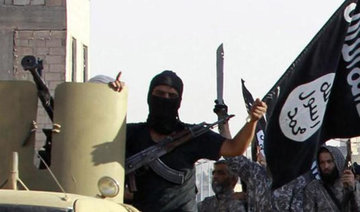WASHINGTON: Al-Qaeda is on the rise again in the shadow of Daesh in Syria, 16 years after the terrorists shocked the US in the Sept. 11, 2001 attacks, experts said.
They said that Hayat Tahrir Al-Sham (HTS), the group that last month seized control of the northern Syrian city of Idlib, is simply a “rebranding” of Al-Qaeda that is positioning itself as more moderate than Daesh in hopes of a resurgence.
“ISIS (Daesh) may be today’s preeminent terrorist threat, but Al-Qaeda in Syria is worrisome. It is Al-Qaeda’s largest global affiliate at this point,” said former White House counterterrorism director Joshua Geltzer.
Speaking on the current terror threat against the US at the New America think tank, Geltzer and other experts said they expect HTS to take center stage among jihadists as the Daesh group loses ground on the battlefield in Syria and Iraq.
HTS is simply a cosmetic name-change for Al-Qaeda, they said. In consolidating control of much of Idlib province, it has eliminated or absorbed rival groups, and is modernizing its propaganda on the web-savvy model of Daesh.
“The organization itself seems to have more lives than a cat,” said Daveed Gartenstein-Ross, co-author with Geltzer of a New America report on the current terrorist threat.
He called Al-Qaeda a “much stronger” organization than in 2010, when its weakness gave way to the rise of Daesh.
“It has skillfully played itself off of ISIS to portray its organization as being the ‘moderate jihadists’, people who you might not like but you can do business with.”
As such it has more popular support, and some official support in the Gulf States.
“Being more restrained than ISIS has been very helpful,” Gartenstein-Ross said.
The New America report stresses the need to focus on Islamic State as the most dangerous external threat at the moment, while noting that since 9/11 all lethal jihadist attacks in the US have been by US citizens or permanent residents.
But it says Al-Qaeda could resume the role of the foremost threat in the future, gathering followers turned off by Daesh’s most extreme tactics.
While current leader Ayman Al-Zawahiri is turgid and uninspiring, the younger leaders in Idlib are learning from the way that Daesh mastered the use of social media to attract followers.
“Al-Qaeda in Syria has undergone cosmetic changes to its naming and organizational design, but without truly renouncing its affiliation with its mother organization,” the study said.
Al-Qaeda on the rise again in shadow of Daesh in Syria: Experts
Al-Qaeda on the rise again in shadow of Daesh in Syria: Experts

Netanyahu appoints adviser with Trump ties to lead ceasefire talks
- The US-born Ron Dermer is a Cabinet minister who’s widely seen as Netanyahu’s closest adviser.
- Dermer currently serves as Israel’s strategic affairs minister
The US-born Ron Dermer is a Cabinet minister who’s widely seen as Netanyahu’s closest adviser. He previously served as Israel’s ambassador to the US and is a former Republican activist with strong ties to the Trump White House.
Israel and Hamas have yet to negotiate a second and more difficult phase of the ceasefire, and the first ends in early March. Palestinians and Arab countries have universally rejected US President Donald Trump’s proposal to remove the Palestinian population from Gaza and take over the territory.
Since the war in Gaza was sparked by Hamas’ attack on Oct. 7, 2023, more than 50,000 people have died in Gaza and Lebanon and nearly 70 percent of the buildings in Gaza have been devastated, according to health ministries in Gaza and Lebanon. Around 1,200 people were killed in Israel during the Oct. 7 attack.
Here’s the latest:
Netanyahu appoints close adviser with Trump ties to lead ceasefire negotiations
An Israeli official said that Prime Minister Benjamin Netanyahu has appointed a close confidant to lead negotiations for the second stage of the ceasefire with Hamas.
The official says that Cabinet Minister Ron Dermer will head the Israeli team. Previous talks have been led by the heads of the Mossad and Shin Bet security agencies.
Talks have not yet started on the second stage, which is meant to include an end to the war, return of all hostages and Israeli pullout from Gaza.
The official spoke on condition of anonymity because the appointment has not been officially announced.
The US-born Dermer is widely seen as Netanyahu’s closest adviser. He previously served as Israel’s ambassador to the US and is a former Republican activist with strong ties to the Trump White House.
Dermer currently serves as Israel’s strategic affairs minister, where he has been a key player in relations with the US as well as Gulf Arab countries.
Tens of thousands of Palestinians flee West Bank refugee camps

- The camps, built for descendants of Palestinian refugees who fled or were driven from their homes in the 1948 war around the creation of the state of Israel, have long been major centers for armed militant groups
JERUSALEM: Tens of thousands of Palestinians living in refugee camps in the occupied West Bank have left their homes as a weeks-long Israeli offensive has demolished houses and torn up vital infrastructure in the heavily built up townships, Palestinian authorities said.
Israeli forces began their operation in the refugee camp in the northern West Bank city of Jenin on Jan. 21, deploying hundreds of troops and bulldozers that demolished houses and dug up roads, driving almost all of the camp’s residents out.
“We don’t know what’s going on in the camp but there is continuous demolition and roads being dug up,” said Mohammed Al-Sabbagh, head of the Jenin camp services committee.

The operation, which Israel says is aimed at thwarting Iranian-backed militant groups in the West Bank, has since been extended to other camps, notably the Tulkarm refugee camp and the nearby Nur Shams camp, both of which have also been devastated. The camps, built for descendants of Palestinian refugees who fled or were driven from their homes in the 1948 war around the creation of the state of Israel, have long been major centers for armed militant groups. They have been raided repeatedly by the Israeli military but the current operation, which began as a ceasefire was agreed in Gaza, has been on an unusually large scale. According to figures from the Palestinian Authority, around 17,000 people have now left Jenin refugee camp, leaving the site almost completely deserted, while in Nur Shams 6,000 people, or about two thirds of the total, have left, with another 10,000 leaving from Tulkarm camp.
“The ones who are left are trapped,” said Nihad Al-Shawish, head of the Nur Shams camp services committee. “The Civil Defense, the Red Crescent and the Palestinian security forces brought them some food yesterday but the army is still bulldozing and destroying the camp.” The Israeli raids have demolished dozens of houses and torn up large stretches of roadway as well as cutting off water and power, but the military has denied forcing residents to leave their homes.
“People obviously have the possibility to move or go where they want, if they will. But if they don’t, they’re allowed to stay,” Lt. Col. Nadav Shoshani told reporters.
The operation began as Israel moved to banish the main UN Palestinian relief organization UNRWA from its headquarters in East Jerusalem and cut it off from any contact with Israeli officials.
The ban, which took effect at the end of January, has hit UNRWA’s work in the West Bank and Gaza, where it provides aid for millions of Palestinians in the refugee camps.
Israel has accused UNRWA of cooperating with Hamas and said some UNRWA workers even took part in the Hamas-led attack on communities in southern Israel on Oct. 7, 2023 that set off the 15-month war in Gaza.
Tens of thousands of Palestinians flee West Bank refugee camps

- The camps, built for descendants of Palestinian refugees who fled or were driven from their homes in the 1948 war around the creation of the state of Israel, have long been major centers for armed militant groups
JERUSALEM: Tens of thousands of Palestinians living in refugee camps in the occupied West Bank have left their homes as a weeks-long Israeli offensive has demolished houses and torn up vital infrastructure in the heavily built up townships, Palestinian authorities said.
Israeli forces began their operation in the refugee camp in the northern West Bank city of Jenin on Jan. 21, deploying hundreds of troops and bulldozers that demolished houses and dug up roads, driving almost all of the camp’s residents out.
“We don’t know what’s going on in the camp but there is continuous demolition and roads being dug up,” said Mohammed Al-Sabbagh, head of the Jenin camp services committee.

The operation, which Israel says is aimed at thwarting Iranian-backed militant groups in the West Bank, has since been extended to other camps, notably the Tulkarm refugee camp and the nearby Nur Shams camp, both of which have also been devastated. The camps, built for descendants of Palestinian refugees who fled or were driven from their homes in the 1948 war around the creation of the state of Israel, have long been major centers for armed militant groups. They have been raided repeatedly by the Israeli military but the current operation, which began as a ceasefire was agreed in Gaza, has been on an unusually large scale. According to figures from the Palestinian Authority, around 17,000 people have now left Jenin refugee camp, leaving the site almost completely deserted, while in Nur Shams 6,000 people, or about two thirds of the total, have left, with another 10,000 leaving from Tulkarm camp.
“The ones who are left are trapped,” said Nihad Al-Shawish, head of the Nur Shams camp services committee. “The Civil Defense, the Red Crescent and the Palestinian security forces brought them some food yesterday but the army is still bulldozing and destroying the camp.” The Israeli raids have demolished dozens of houses and torn up large stretches of roadway as well as cutting off water and power, but the military has denied forcing residents to leave their homes.
“People obviously have the possibility to move or go where they want, if they will. But if they don’t, they’re allowed to stay,” Lt. Col. Nadav Shoshani told reporters.
The operation began as Israel moved to banish the main UN Palestinian relief organization UNRWA from its headquarters in East Jerusalem and cut it off from any contact with Israeli officials.
The ban, which took effect at the end of January, has hit UNRWA’s work in the West Bank and Gaza, where it provides aid for millions of Palestinians in the refugee camps.
Israel has accused UNRWA of cooperating with Hamas and said some UNRWA workers even took part in the Hamas-led attack on communities in southern Israel on Oct. 7, 2023 that set off the 15-month war in Gaza.
More than one million Syrians return to their homes: UN

- “Since the fall of the regime in Syria we estimate that 280,000 Syrian refugees and more than 800,000 people displaced inside the country have returned to their homes,” Filippo Grandi, the UN High Commissioner for Refugees
GENEVA: More than one million people have returned to their homes in Syria after the overthrow of Bashar Assad, including 280,000 refugees who came back from abroad, the UN said on Tuesday.
Assad was toppled in December in a rebel offensive, putting an end to his family’s decades-long grip on power in the Middle Eastern country and bookmarking a civil war that broke out in 2011, with the brutal repression of anti-government protests.
Syria’s war has killed more than half a million people and displaced millions from their homes.
The Islamist-led rebels whose offensive ousted Assad have sought to assure the international community that they have broken with their past and will respect the rights of minorities.
“Since the fall of the regime in Syria we estimate that 280,000 Syrian refugees and more than 800,000 people displaced inside the country have returned to their homes,” Filippo Grandi, the UN High Commissioner for Refugees, wrote on the X social media platform.
“Early recovery efforts must be bolder and faster, though, otherwise people will leave again: this is now urgent!” he said.
At a meeting in Paris in mid-February, some 20 countries, including Arab nations, Turkiye, Britain, France, Germany, Canada and Japan agreed at the close of a conference in Paris to “work together to ensure the success of the transition in a process led by Syria.”
The meeting’s final statement also pledged support for Syria’s new authorities in the fight against “all forms of terrorism and extremism.”


















